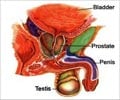A new diagnostic test may combine several biomarkers to increase the sensitivity and specificity of diagnosis of prostate cancer.

German Researchers led by Professor Friedemann Horn and Professor Manfred Wirth are developing a new test that will be useful for diagnosing prostate cancer. The new test will detect several non-protein-coding parts of RNA that can be used as prostate cancer markers. RNA is the part of the cell, which helps decode information from DNA and use it to assemble amino acids and form proteins. The RNA sequence has non-protein-coding parts, which were earlier thought to have no purpose. However, later research has shown that they may be associated with cancer development. Therefore, if the non-protein coding RNA associated with prostate cancer are identified, their presence in a person undergoing screening could indicate the presence of prostate cancer. Accuracy would be improved if a test measured a group of such markers rather than a single one.
The researchers studied RNA from prostate cancer cells obtained from surgically removed prostate cancers in several patients to note which long non-protein coding RNA are more common in these cells, and could be used as biomarkers. The test will be conducted on urine samples obtained from patients, which makes sample collection very easy.
Though the research is in a very early stage, it appears to be in the right direction.
Dr. S. Shroff, a leading Urologist from India said, "This is the first time a new approach has been taken to detect prostate cancer using a combination of biomarkers in the urine and develop a chip to increase the sensitivity and the specificity of the test to detect these cancers."
Reference:
- European Association of Urology Congress press release
Source-Medindia














